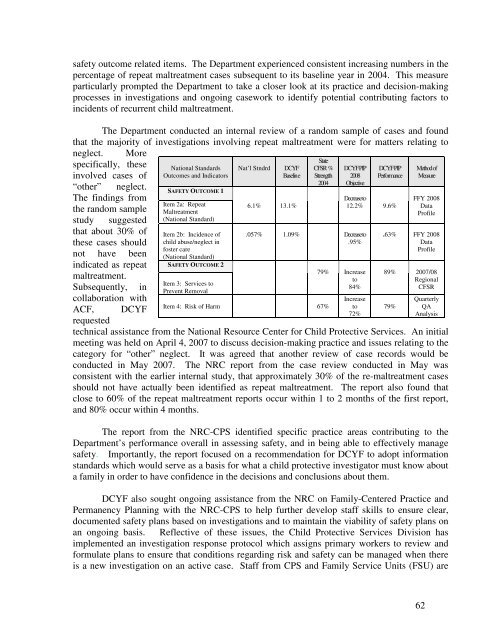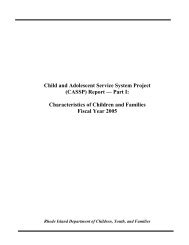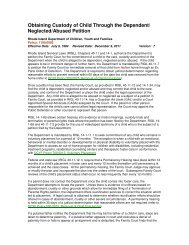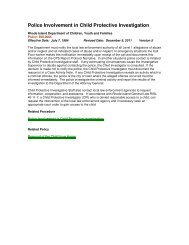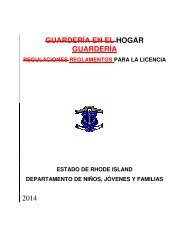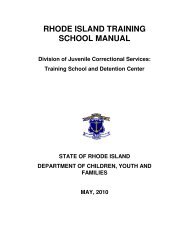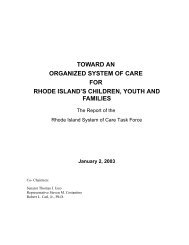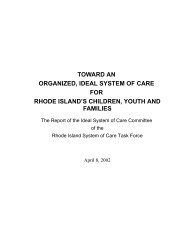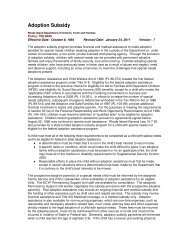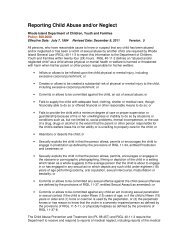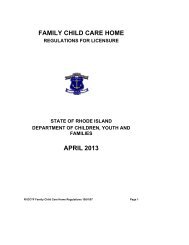CFSP 5 Year Plan - RI Department of Children, Youth & Families
CFSP 5 Year Plan - RI Department of Children, Youth & Families
CFSP 5 Year Plan - RI Department of Children, Youth & Families
You also want an ePaper? Increase the reach of your titles
YUMPU automatically turns print PDFs into web optimized ePapers that Google loves.
safety outcome related items. The <strong>Department</strong> experienced consistent increasing numbers in the<br />
percentage <strong>of</strong> repeat maltreatment cases subsequent to its baseline year in 2004. This measure<br />
particularly prompted the <strong>Department</strong> to take a closer look at its practice and decision-making<br />
processes in investigations and ongoing casework to identify potential contributing factors to<br />
incidents <strong>of</strong> recurrent child maltreatment.<br />
The <strong>Department</strong> conducted an internal review <strong>of</strong> a random sample <strong>of</strong> cases and found<br />
that the majority <strong>of</strong> investigations involving repeat maltreatment were for matters relating to<br />
neglect. More<br />
State<br />
specifically, these<br />
National Standards Nat’l Stndrd DCYF CFSR % DCYF PIP DCYF PIP Method <strong>of</strong><br />
involved cases <strong>of</strong> Outcomes and Indicators<br />
Baselin e Sttrengtth 2008 Performance Measure<br />
2004 Objective<br />
“other” neglect.<br />
SAFETY OUTCOME 1<br />
The findings from<br />
Decrease to<br />
FFY 2008<br />
Item 2a: Repeat<br />
6.1% 13.1%<br />
12.2% 9.6% Data<br />
the random sample Maltreatment<br />
Pr<strong>of</strong>ile<br />
study suggested (National Standard)<br />
that about 30% <strong>of</strong> Item 2b: Incidence <strong>of</strong> .057% 1.09% Decrease to .63% FFY 2008<br />
these cases should child abuse/neglect in<br />
.95%<br />
Data<br />
foster care<br />
Pr<strong>of</strong>ile<br />
not have been (National Standard)<br />
indicated as repeat SAFETY OUTCOME 2<br />
maltreatment.<br />
Item 3: Services to<br />
Prevent Removal<br />
79% Increase<br />
to<br />
84%<br />
89% 2007/08<br />
Regional<br />
CFSR<br />
Subsequently, in<br />
collaboration with<br />
Increase<br />
Quarterly<br />
Item 4: Risk <strong>of</strong> Harm 67% to 79% QA<br />
ACF, DCYF<br />
72%<br />
Analysis<br />
requested<br />
technical assistance from the National Resource Center for Child Protective Services. An initial<br />
meeting was held on April 4, 2007 to discuss decision-making practice and issues relating to the<br />
category for “other” neglect. It was agreed that another review <strong>of</strong> case records would be<br />
conducted in May 2007. The NRC report from the case review conducted in May was<br />
consistent with the earlier internal study, that approximately 30% <strong>of</strong> the re-maltreatment cases<br />
should not have actually been identified as repeat maltreatment. The report also found that<br />
close to 60% <strong>of</strong> the repeat maltreatment reports occur within 1 to 2 months <strong>of</strong> the first report,<br />
and 80% occur within 4 months.<br />
The report from the NRC-CPS identified specific practice areas contributing to the<br />
<strong>Department</strong>’s performance overall in assessing safety, and in being able to effectively manage<br />
safety. Importantly, the report focused on a recommendation for DCYF to adopt information<br />
standards which would serve as a basis for what a child protective investigator must know about<br />
a family in order to have confidence in the decisions and conclusions about them.<br />
DCYF also sought ongoing assistance from the NRC on Family-Centered Practice and<br />
Permanency <strong>Plan</strong>ning with the NRC-CPS to help further develop staff skills to ensure clear,<br />
documented safety plans based on investigations and to maintain the viability <strong>of</strong> safety plans on<br />
an ongoing basis. Reflective <strong>of</strong> these issues, the Child Protective Services Division has<br />
implemented an investigation response protocol which assigns primary workers to review and<br />
formulate plans to ensure that conditions regarding risk and safety can be managed when there<br />
is a new investigation on an active case. Staff from CPS and Family Service Units (FSU) are<br />
62


